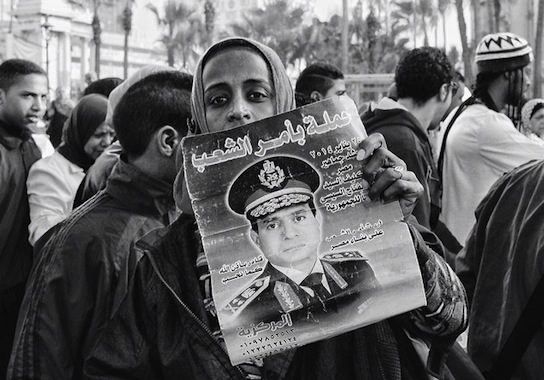What’s Happening in Egypt?

The turmoil and tension surrounding Ukraine has dominated the media as of late—and before that, war in Syria drove the news for many months. But a year ago Egypt was preeminent: the military overthrow of elected President Muhammed Morsi last summer brought both outrage and applause from various factions.
Now, Abdul-Fattah el-Sisi, the defense minister who led last summer’s takeover, is running for president. Sisi has been in charge since last year’s military takeover—this would just put a formal title to his rulership. New York Times reporter David Kirkpatrick believes it’s likely, almost certain, he will win: “Several would-be candidates have declined to enter the presidential race, arguing that the support of the military and security services all but guaranteed Mr. Sisi’s election,” he writes.
Yahoo News reporters Maggie Michael and Lee Keath report that Sisi has surrounded himself with former President Hosni Mubarak’s circle of “politicians, technocrats and big businessmen,” suggesting his presidency would mark a return to the autocratic methods of bygone days.
But Financial Times reporter David Gardner believes Sisi will amass more power than Mubarak, for a few reasons: first, “he has tilted power away from the security services towards the army,” and has used the new constitution to bolster military power. Second, branding the Muslim Brotherhood as a terrorist group and throwing 15,000 to 20,000 of its members into prison has solidified his political prospects. While Sisi may hang up his uniform, notes Gardner, he hasn’t given up its power.
Though some view his candidacy with skepticism, Michael and Keath note “large sectors of the population are likely to back him out of a desire for stability or out of resentment of the Brotherhood.” Younis Makhyoun, leader of the Islamist al-Nour Party, said Sisi is very popular in rural Egypt, “where most of Egypt’s population of 90 million live.”
A “cult of personality” has sprung up around Sisi in recent months, according to TIME Magazine—due in part to affirmative media reporting, but also due to Sisi’s charisma and and the feelings of safety he encourages. Little is known about his personal character or history: “He’s basically this mystery man,” Issandr El Amrani, North Africa director for International Crisis Group, told TIME. “…Obviously he benefits from the love of the military. But beyond that we know very little of Sisi and his personality, temperament and beliefs.”
Meanwhile, recent judicial sentencings in Egypt have triggered severe condemnation around the world. Almost 530 Muslim Brotherhood protesters were sentenced to death on Monday. It was a 45-minute trial, reports the Christian Science Monitor, and one percent of the town Mattay’s population were sentenced to death. Following the trial, a Facebook user from the town morbidly joked, “Will anyone not sentenced to death in Mattay please like this status update so we can figure out how many of us are left?”
Amnesty International called the sentencing “injustice writ large”, and said it was the largest “batch” of simultaneous death sentences seen in recent years—”not just in Egypt but anywhere in the world.”
An additional 15,000 dissidents remain in prison: most are members of the Muslim Brotherhood, though some are journalists or secular activists, writes New Republic contributor Laura Dean. “The prosecution is completely overwhelmed and hundreds of people often face the same blanket charges,” she writes. “Ragia Omran, human rights attorney and member of the Council for Human Rights, called on government to implement the new constitution, including the right to a lawyer.”
Coptic Christians continue to face “endemic” persecution throughout the country. According to a report by Fides News Agency, the Copts continue to be a target of violence—especially in the governorates of Luxor, Sohag and Aswan. “Reference is made to abductions, expropriation of houses, shops looted where Egyptian Copts continue to be targeted victims,” said Fides. “The worrying scenario has been reconstructed in detail on the basis of meetings with community representatives, civil society organizations and material provided which witness this phenomena of violence.”
Al-Ahram Weekly reported that 10 Coptic citizens, including five doctors, were recently kidnapped in Minya. Such kidnappings have happened regularly as of late. Contributor Michael Adel notes that Coptic Pope Tawadros II has voiced support for Sisi—most likely tied to the stability his rule is promised to bring: “In a televised statement, the pope passed a grim verdict on the uprisings of the Arab Spring, saying that what they brought to the region was a long ‘winter’ and the opportunity for ‘evil hands’ to split our nations apart.”
“The scale of Egypt’s problems, with its economy at a standstill, polarised politics and a gathering jihadist insurgency, is giddying,” writes Gardner. There are 85 million people in the Nile valley and delta, and nearly half are below the poverty line. Gardner writes of an economy riddled with crony capitalists and the military’s “business empire.”
Many in the region have called on Sisi to bring an era of inclusion and reform to Egypt. But in a country whose political life has been “poor, nasty, brutish, and short,” the rise of a safety-promising Leviathan seems more likely than that of a democratic savior.
Comments